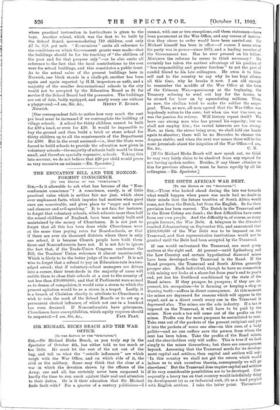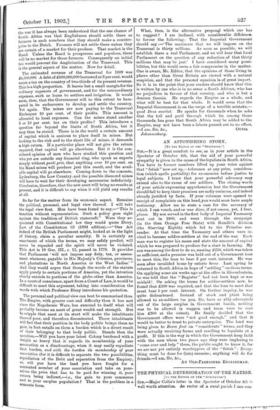THE SOUTH AFRICAN WAR DEBT.
[To TRY EDITOR OP THE " SPECTATOR."1
SIR,—Those who looked ahead during the late war towards what would happen when peace was made had no doubt in their minds that the future troubles of South Africa would come, not from the Dutch, but from the English. So far their prevision has been correct. The Dutch in the Transvaal and in the River Colony are dumb ; the first difficulties have come from our own people. And the difficulty is, of course, as many people foresaw, the War Debt. A telegram in the Standard reached Johannesburg on September 9th, and announced that 2100,000,000 of the War Debt was to be imposed on the Transvaal, and that representative institutions would not be granted until the Debt had been accepted by the Transvaal.
If one would understand the Transvaal, one must grasp matters at the right end. At present—until Lydenburg and the Low Country and certain hypothetical diamond mines have been developed—the Transvaal is the Rand. If the Rand prospers, the Transvaal and South Africa generally prosper also. Each individual, though he have no connection with mining nor looks at a share-list from year's end to year's end, yet has his livelihood conditioned by the state of the Rand mines. If they prosper, he prospers ; if they are de- pressed, his occupation—be it farming or keeping a shop or drawing teeth—suffers in direct consequence. At this moment the mines are depressed for reasons which will appear in the sequel, and as a direct result every one in the Transvaal is depressed also. The mines are the sole industry. If a tax is imposed on the Transvaal, it will have to be paid by the mines. Now such a tax will come out of the profits on the mines. Profits can for most purposes be assimilated to rent. Take rent out of the pockets of the present recipient and put it into the pockets of some one else—in this case, of a body politic—and no one suffers save the person from whom the rent has been taken. Take the profits of the Rand mines, and the shareholders only will suffer. This is true if we look simply to the mines themselves ; but there are consequences beyond. Assuming that the Transvaal needs for its develop- ment capital and settlers, then capital and settlers will say: 'In this country we shall not get the return which would induce us to sink ourselves therein, consequently we will go elsewhere.' But the Transvaal does require capital and settlers if its very considerable possibilities are to be developed. Con- sequently a heavy tax on that country would indefinitely delay its development-(a) as an industrial prat, (b) as a land peopled with English settlers. I take the latter point. Throuchout
the war it has always been understood that the one chance of South Africa was that Englishmen should settle there as farmers in such numbers that they should make a counter- poise to the Dutch. Farmers will not settle there unless they are certain of a market for their produce. That market is the Rand. Unless the Rand is prosperous and populous, there will be no market for those farmers. Consequently an initial tax would prevent the Anglicisation of the Transvaal. This is the general aspect of the matter. Now for detail.
The estimated revenue of the Transvaal for 1899 was £4,500,000. A debt of £100,000,000 borrowed at 3 per cent. would mean a tax on the country of two-thirds of its present revenue. This is a high proportion. It leaves but a small margin for the ordinary expenses of government, and for the extraordinary expenses, such as loans to settlers and irrigation. It would seem, then, that the Government will to this extent be ham- pered in its endeavours to develop and settle the country. Yet again. The mines are now paying to the Transvaal Exchequer 10 per cent. of their profits. This amount is allocated to local expenses. Can the mines stand another 5 or 10 per cent. tax on their profits ? This introduces a question far beyond the limits of South Africa, but it may thus be stated. There is in the world a certain amount of capital which is anxious to place itself in mines. But looking to the risk and to the short life of mines, it demands a high return. If a particular place will not give the return required, that capital will go elsewhere. But it is the con- sidered opinion of men who have studied this question and who yet are outside any financial ring, who speak as experts simply without parti pris, that anything over 10 per cent. on the Rand mines will produce just this result, and the avail- able capital will go elsewhere. Coming down to the concrete, Lydenburg, the Low Country, and the possible diamond mines will have to wait for their developing necessaries indefinitely. Conclusion, therefore, that the new asset will bring no results at present, and it is difficult to say when it will yield any results at ail.
So far for the matter from its economic aspect. Remains the political, personal, and legal view thereof. I will take the legal view first. Men have been found to say,—" This is taxation without representation. Such a policy goes right against the tradition of British statecraft." Were they ac- quainted with Constitutional law they would quote Dicey. Law of the Constitution 63 (1893 edition) :—" One Act indeed of the British Parliament might, looked at in the light of history, claim a peculiar sanctity. It is certainly an enactment of which the terms, we may safely predict, will never be repealed and the spirit will never be violated. This Act is 18 Geo. TIL, c. 12, passed in 1778. It provides that Parliament will not impose any duty, tax, or assess- ment whatever, payable in His Majesty's Colonies, provinces, and plantations in North America or the West Indies.'" And they would argue that though the words of the statute apply purely to certain portions of America, yet the intention clearly extends to portions of the globe other than America. In a court of conscience, apart from a Court of Law, it would be difficult to meet this argument, taking into consideration the words with which Professor Dicey introduces his quotation.
The personal and political view can best be summarised thus. The Empire, with greater cost and difficulty than it has met since the Napoleonic Wars, has annexed to itself what will probably become an asset of great wealth and strength. But to cripple that asset at its start will make the inhabitants thereof poor, and therefore discontented. Those inhabitants will feel that their position in the body politic brings them no gam, in fact entails on them a burden which is a direct result of their belonging to that body politic. Stands then the ques. tion,—Will you have your latest Colony burdened with a weight so heavy that it regards its membership of your association as a disadvantage, when it may easily repudiate that burden, and with the burden its membership of your association (for it is difficult to separate the two possibilities, repudiation of the Debt and separation from the Empire); Or, will you have the land you have fought for a oontented member of your association and take on your- selves the price that has to be paid for winning it, your return being indirect,—.i.e., the gain to your commerce and to your surplus population ? That is the problem in a eouctete form.
What, then, is the alternative propos41 which one has to suggest ? I am inclined, with considerable diffidence, to favour the following: That the Imperial Government should say The maximum that we will impose on the Transvaal is thirty millions. As soon as possible, we will establish there a real Parliament, and we will hear that local Parliament on the question of any reduction of that thirty millions that may be just.' I have considered many possi- bilities, but this would seem a fair compromise in the matter. One is aware, Mr. Editor, that the opinions of those living in places other than Great Britain are viewed with a natural suspicion, and that the personal equation is of great import. So it is to the point that your readers should know that this is written by one who is in no sense a South African, who has no prejudices in favour of that country, and who is but a denizen therein. He regards the Empire as a whole, and what will be best for that whole. It would seem that the Imperial Government is on the verge of a terrible mistake,— quod Deus avertat. He speaks for thousands when he asks that the toil and peril through which he, among those thousands, has gone that South Africa may be added to the Empire, may not have been a labour poured out to no effect.











































 Previous page
Previous page